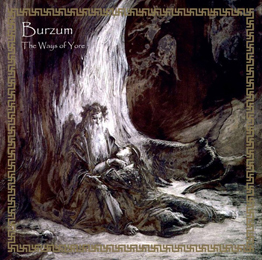
This album is in the vein of the latest one, meaning no more (Black) metal anymore, yet another Ambient-laden recording; what was going on? Is our dear Count sentenced to prison once again, or didn’t he want to caress his guitar strings anymore? I do not know, I have no idea, but just like last year’s Sôl Austan, Mâni Vestan, The Ways Of Yore is rather comparable to albums like Daudi Baldrs or Hlidskjàlf- though there are differences for sure as well. Anyway, this new Burzum-album (the twelfth studio record) is another step within Burzum’s rich music(k)al history. In mean time I found out that the Count will not be creating and playing Metal anymore. No further comment…
The Ways Of Yore consists of thirteen tracks with a total duration of sixty nine minutes. And as from the first track, God From The Machine, it is rather clear that this album indeed is a completely new kind of musical expression. The song sounds like some ethnic kind of Folk / Neo-Folk, with ritualistic percussion and hypnotic acoustic guitar melodies (and a couple of traditional instruments at the background, I think). The Portal goes little further, by breathing a cosmic happiness (though filled with melancholy) in the vein of, and don’t you faint, Fata Morgana, the most ‘happy’ project of Mortiis. Heill Odinn, and this is an important difference with the completely instrumental predecessor Sôl Austan, Mâni Vestan, is an epic chant with a focus on harmonious voices, supported once again by simplistic acoustic riffs and ritual percussion. The Lady In The Lake, the fourth track, comes with another approach, and might come most closely to what Burzum did on Daudi Baldrs and Hlidskjàlf. But I need to refer to Mortiis once again, and then especially to the Cintecele Diavolui-project. Throughout the album, there are comparisons in between the compositions, but there are differences as well by using additional elements (a couple of cosmic electronics, and something that sounds like electric guitar distortion), the contrast in between ambient and folkish parts, the contrast in between pure simplicity and some more complex constructions, etc. And whether you do appreciate it or if you do not, the album includes two reworked older compositions, i.e. Tomhet (here called Emptiness) and Til Hel Og Tilbake Igjen (To Hell And Back Again).
When talking about the vocals, well, Varg Vikernes surely is not the best singer ever (and then I am not referring to his screams Of Old, because I do not want to say anything negative about the early years!). Sometimes he tries to ‘sing’, and more than once he also makes use of spoken words, whether you like it or not. He did so in the past (cf. Umskiptar), and on several tracks right here it is the case as well.
A mixture of Cintecele Diavolui / Fata Morgana, Sol Invictus, World Serpent-stuff, Ildfrost’s Natanael, and of course the former Ambient-releases Burzum did… Only, it’s not that ground-breaking…
